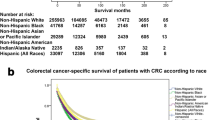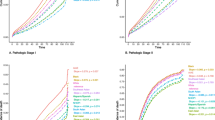Opinion statement
Treatment of colorectal carcinoma remains challenging, especially in patients with recurrent or metastatic disease. Despite advances in screening and treatment of this cancer, health care disparities remain one of the major yet amendable factors that can lead to differences in outcomes. As clinicians, we need to be aware of such disparities to better tailor our screening and treatment interventions for our patients. Knowing that socioeconomic status, educational status, and personal beliefs contribute to racial disparities in this disease, as clinicians we should strive to know our patients and their beliefs to help minimize this discrepancy. Additionally, we need to maintain and advance our knowledge by keeping up with all clinical and translational research in the field and create strategies to increase enrollment of racial minorities in clinical trials. While conventional chemotherapies continue to play a vital role, it is becoming more and more evident that treatment strategies need to be personalized. Understanding the molecular biology of cancer has changed the landscape of new therapies. Future research needs to be directed towards understanding genetic, biological, and pharmacogenetic and genomic contributors to the development of disease and treatment responses.
Similar content being viewed by others
References and Recommended Reading
Papers of particular interest, published recently, have been highlighted as: • Of importance •• Of major importance
Siegel R, Naishadham D, Jemal A. Cancer statistics, 2012. CA Cancer J Clin. 2012;62:10–29.
American Cancer Society. Cancer Facts & Figures 2009. Atlanta: American Cancer Society; 2009.
American Cancer Society: Facts and Figures for African Americans 2011–2012. 2011.
AICR. World Cancer Research Fund/American Institute for Cancer Research, Food, Nutrition, Physical Activity, and the Prevention of Cancer: A Global Perspective. Washington DC AICR, 2007.
Howlader N, Krapcho M, et al. SEER Cancer Statistics Review, 1975–2009, National Cancer Institute. Bethesda, MD. http://seer.cancer.gov/csr/1975_2009_pops09/, based on November 2011 SEER data submission, posted to the SEER website, April 2012.
Robbins AS, Siegel RL, Jemal A. Racial disparities in stage-specific colorectal cancer mortality rates from 1985 to 2008. J Clin Oncol. 2012;30:401–5.
American Cancer Society. Colorectal Cancer Facts & Figures 2011–2013. Atlanta: American Cancer Society; 2011.
Levin BLD, McFarland B, et al. Screening and surveillance for the early detection of colorectal cancer and adenomatous Polyps, 2008: a joint guideline from the American Cancer Society, the US Multi-Society Task Force on Colorectal Cancer, and the American College of Radiology. CA Cancer J Clin. 2008;58(3):130–60.
American Cancer Society. Cancer Prevention & Early Detection Facts & Figures 2011. Atlanta: American Cancer Society; 2011.
Miranda PY, Johnson-Jennings M, Tarraf W, Gonzalez P, Vega WA, Gonzalez HM. Using colorectal trends in the U.S. to identify unmet primary care needs of vulnerable populations. Prev Med. 2012;55:131–6.
Wallace PM, Suzuki R. Regional, racial, and gender differences in colorectal cancer screening in middle-aged African-Americans and whites. J Cancer Educ. 2012.
Shavers VL. Racial/ethnic variation in the anatomic subsite location of in situ and invasive cancers of the colon. J Natl Med Assoc. 2007;99:733–48.
Mostafa G, Matthews BD, Norton HJ, Kercher KW, Sing RF, Heniford BT. Influence of demographics on colorectal cancer. Am Surg. 2004;70:259–64.
Thornton JG, Morris AM, Thornton JD, Flowers CR, McCashland TM. Racial variation in colorectal polyp and tumor location. J Natl Med Assoc. 2007;99:723–8.
Lieberman DA, Holub JL, Moravec MD, Eisen GM, Peters D, Morris CD. Prevalence of colon polyps detected by colonoscopy screening in asymptomatic black and white patients. JAMA. 2008;300:1417–22.
Lee B, Holub J, Peters D, Lieberman D. Prevalence of colon polyps detected by colonoscopy screening of asymptomatic Hispanic patients. Dig Dis Sci. 2012;57:481–8.
Gorham ED, Garland CF, Garland FC, et al. Optimal vitamin D status for colorectal cancer prevention: a quantitative meta analysis. Am J Prev Med. 2007;32:210–6.
Fiscella K, Winters P, Tancredi D, Hendren S, Franks P. Racial disparity in death from colorectal cancer: does vitamin D deficiency contribute? Cancer. 2011;117:1061–9. This article highlights a new area of research involving the role of vitamin D in CRC and the potential for this envirnomental risk factor to contribute to racial disparities. More research is needed to evaluate the role of vitamin D deficiency in accounting for adverse health outcomes in the African American population.
Ng K, Meyerhardt JA, Wu K, et al. Circulating 25-hydroxyvitamin d levels and survival in patients with colorectal cancer. J Clin Oncol. 2008;26:2984–91.
Liu G, Hu X, Chakrabarty S. Vitamin D mediates its action in human colon carcinoma cells in a calcium-sensing receptor-dependent manner: downregulates malignant cell behavior and the expression of thymidylate synthase and survivin and promotes cellular sensitivity to 5-FU. Int J Cancer. 2010;126:631–9.
Sylvester BE, Huo D, Khramtsov A, et al. Molecular analysis of colorectal tumors within a diverse patient cohort at a single institution. Clin Cancer Res. 2012;18:350–9. This article looked at molecular analysis of colorectal tumors to evaluate for differences in the pathways driving CRC progression in African Americans compared with Caucasians. These results highlight the importance of further research into the molecular mechansims driving CRC progression in understudied minority populations.
Chien C, Morimoto LM, Tom J, Li CI. Differences in colorectal carcinoma stage and survival by race and ethnicity. Cancer. 2005;104:629–39.
Doubeni CA, Field TS, Buist DS, et al. Racial differences in tumor stage and survival for colorectal cancer in an insured population. Cancer. 2007;109:612–20.
Laiyemo AO, Doubeni C, Pinsky PF, et al. Race and colorectal cancer disparities: health-care utilization vs different cancer susceptibilities. J Natl Cancer Inst. 2010;102:538–46. This article looks at disparities in timely follow-up as an etiology for racial differences in stage-specific mortality reminding us as clinicians about the importance of follow-up with our patients.
Ayanian JZ, Zaslavsky AM, Guadagnoli E, et al. Patients' perceptions of quality of care for colorectal cancer by race, ethnicity, and language. J Clin Oncol. 2005;23:6576–86.
Demissie K, Oluwole OO, Balasubramanian BA, Osinubi OO, August D, Rhoads GG. Racial differences in the treatment of colorectal cancer: a comparison of surgical and radiation therapy between whites and blacks. Ann Epidemiol. 2004;14:215–21.
Govindarajan R, Shah RV, Erkman LG, Hutchins LF. Racial differences in the outcome of patients with colorectal carcinoma. Cancer. 2003;97:493–8.
Baldwin LM, Dobie SA, Billingsley K, et al. Explaining black-white differences in receipt of recommended colon cancer treatment. J Natl Cancer Inst. 2005;97:1211–20.
Stewart JH, Bertoni AG, Staten JL, Levine EA, Gross CP. Participation in surgical oncology clinical trials: gender-, race/ethnicity-, and age-based disparities. Ann Surg Oncol. 2007;14:3328–34.
Capitain O, Boisdron-Celle M, Poirier AL, Abadie-Lacourtoisie S, Morel A, Gamelin E. The influence of fluorouracil outcome parameters on tolerance and efficacy in patients with advanced colorectal cancer. Pharmacogenomics J. 2008;8:256–67.
Lecomte T, Ferraz JM, Zinzindohoue F, et al. Thymidylate synthase gene polymorphism predicts toxicity in colorectal cancer patients receiving 5-fluorouracil-based chemotherapy. Clin Cancer Res. 2004;10:5880–8.
Mandola MV, Stoehlmacher J, Zhang W, et al. A 6 bp polymorphism in the thymidylate synthase gene causes message instability and is associated with decreased intratumoral TS mRNA levels. Pharmacogenetics. 2004;14:319–27.
Lampe JW, Bigler J, Horner NK, Potter JD. UDP-glucuronosyltransferase (UGT1A1*28 and UGT1A6*2) polymorphisms in Caucasians and Asians: relationships to serum bilirubin concentrations. Pharmacogenetics. 1999;9:341–9.
McLeod HL, Sargent DJ, Marsh S, et al. Pharmacogenetic predictors of adverse events and response to chemotherapy in metastatic colorectal cancer: results from North American Gastrointestinal Intergroup Trial N9741. J Clin Oncol. 2010;28:3227–33. This article is of significant importance, highlighting the potential impact of pharmacogenetic predictors of response in advanced CRC and the role for clinical application. This trial prospectively included pharmacogenetic sampling in the context of a multicenter study of patients to assess the impact of genetic markers on adverse events and resposne.
Goldberg RM, McLeod HL, Sargent DJ, Morton RF, Green EM, Fuchs C, Ramanathan RK, Williamson SK, Findlay BP, Pitot HC, Alberts SR. Genetic polymorphisms, toxicity, and response rate in African Americans (AA) with metastatic colorectal cancer (MCRC) compared to Caucasians (C) when treated with IFL, FOLFOX or IROX in Intergroup N9741. Journal of Clinical Oncology, 2006 ASCO Annual Meeting Proceedings Part I Vol 24, No 18S (June 20 Supplement), 2006: 3503.
McCollum AD, Catalano PJ, Haller DG, et al. Outcomes and toxicity in african-american and caucasian patients in a randomized adjuvant chemotherapy trial for colon cancer. J Natl Cancer Inst. 2002;94:1160–7.
Sanoff HK, Sargent DJ, Green EM, McLeod HL, Goldberg RM. Racial differences in advanced colorectal cancer outcomes and pharmacogenetics: a subgroup analysis of a large randomized clinical trial. J Clin Oncol. 2009;27:4109–15.
Conflict of Interest
Kelly Dorsey, Zheng Zhou, Rawia Masaoud, and Halla S. Nimeiri declare they have no conflict of interest.
Human and Animal Rights and Informed Consent
This article does not contain any studies with human or animal subjects performed by any of the authors.
Author information
Authors and Affiliations
Corresponding author
Rights and permissions
About this article
Cite this article
Dorsey, K., Zhou, Z., Masaoud, R. et al. Health Care Disparities in the Treatment of Colorectal Cancer. Curr. Treat. Options in Oncol. 14, 405–414 (2013). https://doi.org/10.1007/s11864-013-0241-9
Published:
Issue Date:
DOI: https://doi.org/10.1007/s11864-013-0241-9




